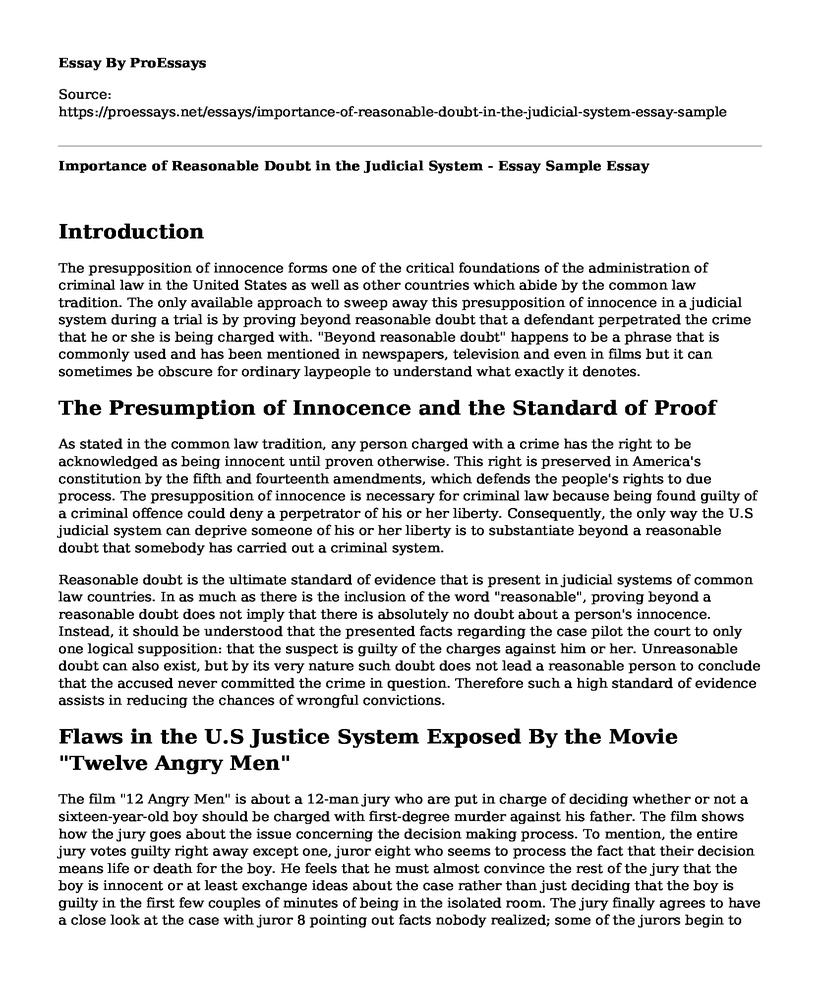Introduction
The presupposition of innocence forms one of the critical foundations of the administration of criminal law in the United States as well as other countries which abide by the common law tradition. The only available approach to sweep away this presupposition of innocence in a judicial system during a trial is by proving beyond reasonable doubt that a defendant perpetrated the crime that he or she is being charged with. "Beyond reasonable doubt" happens to be a phrase that is commonly used and has been mentioned in newspapers, television and even in films but it can sometimes be obscure for ordinary laypeople to understand what exactly it denotes.
The Presumption of Innocence and the Standard of Proof
As stated in the common law tradition, any person charged with a crime has the right to be acknowledged as being innocent until proven otherwise. This right is preserved in America's constitution by the fifth and fourteenth amendments, which defends the people's rights to due process. The presupposition of innocence is necessary for criminal law because being found guilty of a criminal offence could deny a perpetrator of his or her liberty. Consequently, the only way the U.S judicial system can deprive someone of his or her liberty is to substantiate beyond a reasonable doubt that somebody has carried out a criminal system.
Reasonable doubt is the ultimate standard of evidence that is present in judicial systems of common law countries. In as much as there is the inclusion of the word "reasonable", proving beyond a reasonable doubt does not imply that there is absolutely no doubt about a person's innocence. Instead, it should be understood that the presented facts regarding the case pilot the court to only one logical supposition: that the suspect is guilty of the charges against him or her. Unreasonable doubt can also exist, but by its very nature such doubt does not lead a reasonable person to conclude that the accused never committed the crime in question. Therefore such a high standard of evidence assists in reducing the chances of wrongful convictions.
Flaws in the U.S Justice System Exposed By the Movie "Twelve Angry Men"
The film "12 Angry Men" is about a 12-man jury who are put in charge of deciding whether or not a sixteen-year-old boy should be charged with first-degree murder against his father. The film shows how the jury goes about the issue concerning the decision making process. To mention, the entire jury votes guilty right away except one, juror eight who seems to process the fact that their decision means life or death for the boy. He feels that he must almost convince the rest of the jury that the boy is innocent or at least exchange ideas about the case rather than just deciding that the boy is guilty in the first few couples of minutes of being in the isolated room. The jury finally agrees to have a close look at the case with juror 8 pointing out facts nobody realized; some of the jurors begin to realize that juror eight might be right. All along the process, jurors' personalities are uncovered with drama surfacing very quickly as the discussion went on further (Rose, 2006).
We like to think that juries, especially in capital murder cases, carefully deliberate on the evidence presented to them before reaching their verdicts. Events in the "Twelve Angry Men" depicts that this is not the case. Jurors are human after all, and so personal prejudices can often get in the way of establishing the truth. What is disturbing about the movie is that an innocent young man is close to being executed mainly because of prejudice against Puerto Ricans. It takes excellent efforts of the juror 8 to get the other jurors to see sense and make the right decision (Ellsworth, 2003).
Real juries, however, do not always have a juror 8-like figure within to convince others for the truth. Justice should not depend on the moral integrity of a single individual. Nonetheless, as juries are often a miniature of the society, with all its faults, its prejudices, and its numerous injustices, it is depressingly believable that justice can sometimes be achieved by an individual standing firm against the majority.
Conclusion
The concept of reasonable doubt is not always widely understood by the general public yet it is a pillar of the universal law criminal justice system. This weight brought about by the need for evidence indeed helps mitigate the risk of people being deprived of their liberty and ensures that all citizens' rights are better protected. Besides, it has been pointed out that one of the major flaws of the U.S judicial system is the lack of a figure that would courageously stand against the others in a jury in an attempt to offer reasonable doubt for the defendant.
References
Ellsworth, P. C. (2003). One Inspiring Jury.
Rose, R. (2006). Twelve angry men. Penguin.
Cite this page
Importance of Reasonable Doubt in the Judicial System - Essay Sample. (2022, Dec 07). Retrieved from https://proessays.net/essays/importance-of-reasonable-doubt-in-the-judicial-system-essay-sample
If you are the original author of this essay and no longer wish to have it published on the ProEssays website, please click below to request its removal:
- Miles Davis Biographical Essay Example
- Compare and Contrast Paper on Mora's Poems: La Migra and Elena
- Drug Abuse and the Problem of Criminalization Essay
- Essay Example on C.S. Lewis: Great Divorce, Realistic Characters
- 21st Century War Films: The New Pathos of the Genre - Research Paper
- Essay on Rubber: Liberia's Largest Cash Crop & Bridgestone-Owned Firestone Liberia's Accusations.
- Essay Example on Amelie: A Story of Life, Love & Mise-en-Scene







